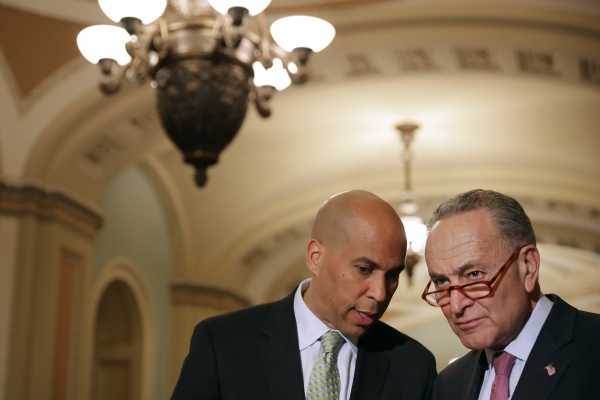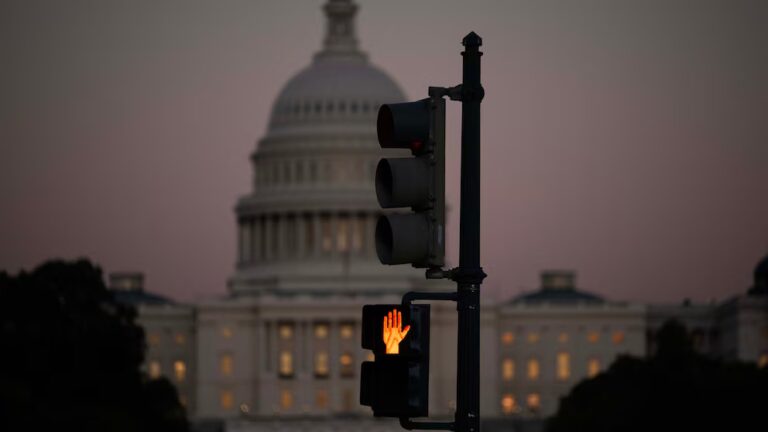
Democrats are angling to sink yet another Trump judicial nominee, but their chances of doing so appear to be dimming.
Democrats’ latest target is Thomas Farr, a North Carolina district judge nominee, who was up for a procedural Senate vote Wednesday. The Senate ultimately voted 50-50 to limit debate on Farr’s nomination, with Vice President Mike Pence on deck to serve as the anticipated tie-breaker. This sets Farr’s nomination up for a floor vote some time on Thursday.
Democrats — who argue that the Raleigh-based attorney has systematically undermined African Americans’ voting rights — were hoping his nomination could go the way of Ryan Bounds, a Ninth Circuit Court nominee who was ultimately withdrawn earlier this year following protests about his past racist writings.
The 49 members of the Democratic caucus along with Republican Sen. Jeff Flake, who has vowed to oppose Trump judicial nominees unless a bill protecting Special Counsel Robert Mueller gets a vote, ended up voting against moving Farr’s nomination forward. Meanwhile, 50 Republicans, including Sen. Tim Scott — who had previously opposed Bounds — voted in favor of it.
Those numbers could still shift when Farr’s confirmation gets a floor vote later this week, but that’s looking increasingly unlikely.
Who is Thomas Farr?
Trump’s judicial nominees have been younger, whiter, and more likely to be male, on average, than those offered up by President Barack Obama, according to a Washington Post analysis. They also have the potential to reshape public policy in dramatic ways.
While Democrats have broadly bristled at a number of these nominees for their conservative leanings, Farr is among a smaller subset that has specifically been called out for positions he’s taken that Democrats say are discriminatory and explicitly targeted at stripping African Americans of their voting rights.
Democrats emphasized Tuesday that they would be open to supporting another nominee in lieu of Farr. The NAACP and the Congressional Black Caucus (CBC) object to Farr over, among other things, his 2016 defense of a North Carolina voter ID law that the Fourth Circuit Court concluded “targeted African Americans with almost surgical precision.”
Farr also helped North Carolina Republicans make the case for partisan gerrymandered congressional districts, and the Supreme Court has since ruled some of these maps unconstitutional. He’s also backed the state when it’s argued that workers shouldn’t be able to bring employment discrimination claims based on race or sex.
“It is no exaggeration to say that had the White House deliberately sought to identify an attorney in North Carolina with a more hostile record on African-American voting rights and workers’ rights than Thomas Farr, it could hardly have done so,” the CBC wrote in a letter to Senate Judiciary leaders last month.
“Why this person? Why in a state in the Eastern District that is diverse, in a state that has a sad history, like so many of our states, with a history of voter suppression?” Sen. Cory Booker (D-NJ) asked during a press briefing on Tuesday. Sen. Kamala Harris (D-CA) also argued that a Farr confirmation would upset the judicial check on state legislatures, which are often sued if they try to implement discriminatory voting rights practices. Harris noted that Farr could very well oversee an upcoming court case in his district on this exact topic.
On top of his own negative track record on race, Farr has been nominated for a judicial seat that has a long and tenuous history. The seat itself has been empty for roughly 12 years, and Democrats say it’s due to Republican efforts to block two African-American women that President Barack Obama had nominated for it.
Democrats still need to peel off one more Republican
If Flake’s current opposition to all judicial nominees remains consistent, Democrats would only need one more person to join their efforts to sink the Farr nomination. Currently it’s not looking like they’ll be able to secure that vote.
In the case of Ryan Bounds’s nomination for the Ninth Circuit earlier this year, Sen. Tim Scott from South Carolina — the lone black lawmaker in the Republican conference — ultimately announced that he would vote against Bounds, who had voiced a series of racist viewpoints in his past college writings. He was later joined by Sen. Marco Rubio (R-FL) as well.
Scott on Wednesday, however, signaled that he would likely back Farr, voting in favor of taking the next procedural step on his nomination.
Farr marks the latest test of whether Democrats can still effectively put up a fight, even as they remain in the minority.
Sourse: vox.com






